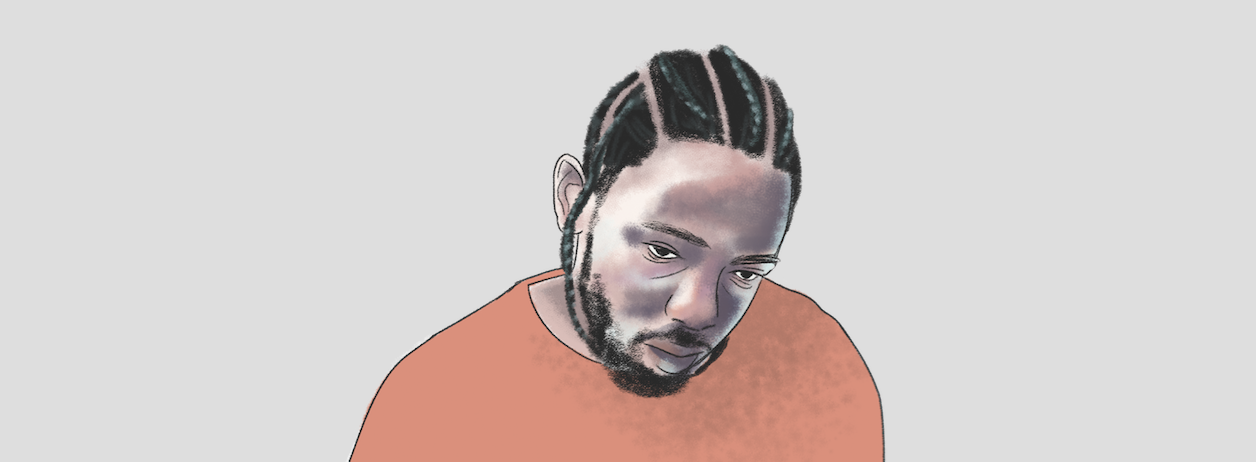After Kendrick Lamar released his third full-length studio album “To Pimp a Butterfly” in 2015, it seemed as though rap had found a new messiah. Hip-hop’s new king and savior, Lamar instilled hope in those sick of repetitive trap beats and hungry for classic, jazz and funk infused rap.
Now, only two years later, Lamar has aimed to prove that his spot atop the ruthless rap hierarchy is safe. “Damn,” his fourth album, is about his relationship with God, coping with fame and his role as a black man in a Trump-era America. However, despite the potential the opening track, “Blood,” had in helping create a tight and conceptual rap record, Lamar fails to create a cohesive concept or theme for “Damn,” like he masterfully had in previous albums. Despite many brilliant musical moments and vulnerable and honest lyricism, “Damn” is spotty, both musically and conceptually, compared to Lamar’s past efforts.
“Damn” begins with “Blood,” in which Lamar tells the haunting tale of being shot by a blind woman after he tries to help her. The fable is then followed up by a clip of FOX News reporters criticizing his lyrics about police brutality from his monumental third album “To Pimp a Butterfly.”
The combination of Lamar’s story and comments from famed Republican news personalities like
Kimberly Guilfoyle and Geraldo Rivera is a goosebump-inducing start to the album, and foreshadows Lamar’s discussion of his influence on mass media and society’s view of black men in general. In songs like “DNA” and “Humble,” Lamar boasts with booming bass, modern trap beats and empowering lyrics like “I got power, poison, pain and joy inside my DNA/I got hustle though, ambition, flow, inside my DNA.” In contrast, Lamar shows a more forthcoming and open side on “Damn’s” emotionally potent tracks like “Feel” and “Fear.” Notably, on “Fear,” he cleverly compares his fears as a 17-year-old living in the center of neighborhood and police violence to his fears as a famed rapper: “At 27 years old, my biggest fear was bein’ judged.” Despite the brilliance of both sides of “Damn’s” spectrum, the moods of the tracks don’t mix well. In past Lamar albums, it seemed like every beat served a higher purpose. Even the dejected and brash side of Lamar worked hand-in-hand — on “Good Kid,” for example, Lamar delivers the catchy “Poetic Justice” and the reserved “Real,” but connects both to writing and one’s identity, a beautiful link in the context of the whole record. But, again, these two conflicting sides of Lamar don’t coalesce on “Damn.”
Regardless of this conceptual inconsistency, Lamar plays with the idea of sins on some of the album’s strongest songs like “Pride” and “Lust.” “Pride” is a slow jam, reminiscent of Lamar’s more jazz and funk influenced “Butterfly” days, and “Lust” sounds lackadaisical, yet still interesting due to some puncturing kick drum.
Despite the strong executions of these songs, perhaps tackling such huge concepts like pride and loyalty is the album’s very problem — to masterfully communicate all your thoughts about “Love” or “God” lyrically and musically while creating a concept album (nearly alone as well; the album only had three featurings) is a near impossible task. “Damn” also hosts some of Lamar’s weakest tracks of his career. “Yah” musically drones on with no real hook or melody, and while some of his lyrics target FOX News’ portrayal of black culture, Lamar brings up an ill-fitting point about people of color, as the children of Israel, being punished for supposed iniquities. “Element” and “XXX,” featuring rock band U2, don’t stand out either, as Lamar utilizes the same droning beats and lethargic rapping as he had in “Yah.”
[column size=two_third position=first ]On the album’s last track, “Duckworth,” Lamar does what he does best: rap about the intersection of his experiences in Compton and his life today. “Duckworth,” Lamar’s real last name, is incredibly dynamic, funky and punchy. On it, Lamar imagines his life if his father and his future producer had not met in a KFC 20 years before Lamar signed with his record label: “Whoever thought the greatest rapper would be from coincidence?/Because if Anthony killed Ducky/Top Dawg could be servin’ life/While I grew up without a father and die in a gunfight.”
[/column][column size=one_third position=last ]
Top Tracks
1. Duckworth
2. Fear
3. Pride
4. Humble
[/column]Moments like “Duckworth” remind us how brilliant Lamar really is. He’s a risk-taker and grabs reins of the story that he wants to tell — few fans or critics doubt that. But despite his accomplishments and virtues, Lamar seems confused and at war with himself on several moments on his newest release; this disorder doesn’t translate into an especially impactful album.



